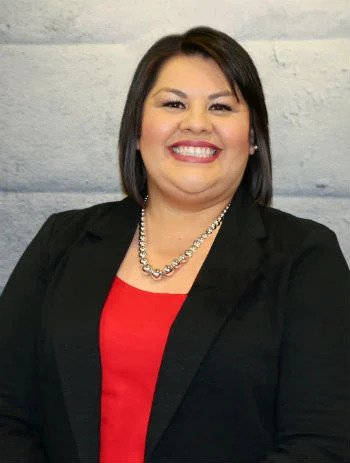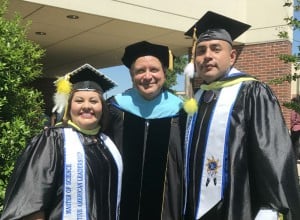When Lisa Martin makes the next seismic shift in her occupation, she’ll have the education to help her navigate new worlds.
Martin earned a Master of Science in Native American Leadership online from Southeastern Oklahoma State University. She graduated in May 2017. A member of the Cheyenne and Arapaho Tribes, Martin plans to transition into tribal politics in the future.
“[The MS] will help later on down the road, when I plan to take my career in a whole other direction,” Martin said. “That will be a while. I want to get a little bit older and more experienced first.”
She already has some experience in switching fields. Martin graduated from the University of Central Oklahoma with a Bachelor of Arts in Criminal Justice in 2004.
“Criminal justice was the plan,” she said. “Then, you get in real life and realize you have a job, you’re just trying to make it to the next job, things happen, life gets in the way and you get side-tracked.”
After a combined decade of work at a juvenile detention center and as a human services case worker, Martin became marketing manager at Lucky Star Casino in Concho, Oklahoma, which is owned by the Cheyenne and Arapaho Tribes.
“I had never done marketing before,” Martin said. “It was totally different. I’m naturally shy and reserved. It’s taken me a lot to open up and be out there like that.
“I was coming into the casino and seeing the opportunities to be able to work with different companies, put ideas together and see my work, whether it be on billboards, TV or newspaper ads. I liked it right away, just because it was something different in a whole other direction.”
Opportunity Knocks
Martin had always longed to return to school for a master’s degree, but the tuition cost had prevented her from taking that leap.
“The [tribal] education director at the time had been working with Southeastern,” she said. “They came and proposed this program and said the tribe would pay for it. That pushed me into doing it. If it wasn’t for that, I don’t know if I would have made it through.”
Although it took some adjustment to fit studies alongside a full-time job, Martin eventually found her groove, along with a friend to help her along the way in the MS program.
“It took a lot of patience and time management,” she said. “It was about halfway through when I finally figured out how to divide my time and how much time I needed to spend online for school. One of my coworkers, Cecil Gray, went through the same program.
“Cecil works with me in the same office. At the time, I didn’t know him. We became friends after we started going through the program. Toward the end, it started getting a little bit easier, because I had somebody to talk to and relate with in these classes we were going to. It made it easier to discuss topics and ideas. That was really great.”
Martin was excited to share the graduation day experience with Gray. She said three other members of the Cheyenne and Arapaho Tribes also graduated from the online MS in Native American Leadership program.
“My family and friends were also excited,” she said. “It’s a big deal, because I am the only one in my family who has ever earned a degree. That added a lot to the day.”
Style Points
Martin said the curriculum helped provide her with management skills she can use both immediately and when she eventually transitions into tribal politics. She said she worked on school about two hours each weekday. She found two courses particularly beneficial.
“I enjoyed Developing the Native American Leader [NAL 5153] because the principles we learned about being a leader could be applied not only in Indian country but out in the everyday workforce,” she said. “Another course that was really good was Current Topics in Indian Country [NAL 5013]. It covered real-life issues, like the Native American mascots in professional sports and medical marijuana use on reservations.”
She also enjoyed the different leadership insights provided by the degree program, especially since she also manages her department at Lucky Star Casino.
“I have definitely been able to apply the personal and organizational leadership styles and principles we learned through some of these courses,” Martin said. “You also learn how to relate to other people, whether they’re native or non-native. They were more on managing diversity in the workplace, being a leader in the workplace. I can definitely utilize it in other areas, too.”
Martin grew up in El Reno, Oklahoma, near the Cheyenne and Arapaho Tribal Complex, where she played softball through high school.
“I wasn’t too involved in the tribe growing up,” she said. “My dad always kept us busy with sports and school. During the summers, that’s all we did.”
Now, she enjoys spending her free time playing with her two chocolate Labrador Retrievers and reading. Even though she didn’t have nearly as much time to enjoy those two activities while she earned her master’s degree, Martin knows it was well worth the effort. And she would encourage anybody to go through the program.
“Just go for it. This is a great program to explore Native American history and cultures while also learning how to apply leadership skills in tribal settings as well as other fields and organizations,” she said. “It will definitely help your career.”
Learn more about the SOSU online MS in Native American Leadership.

